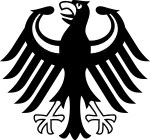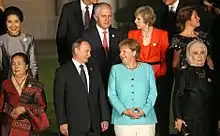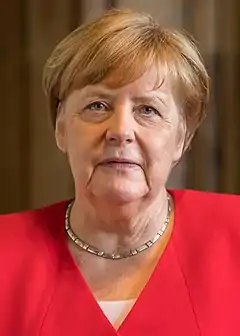Foreign policy of the Angela Merkel government
The foreign policy of the Angela Merkel government has been the foreign policy of Germany since Merkel took office as Chancellor of Germany in November 2005. During Merkel's chancellorship, Merkel has personally been highly active in the field of the foreign policy. She named Frank-Walter Steinmeier to serve as Minister for Foreign Affairs from 2005 to 2009; the office was subsequently held by Guido Westerwelle from 2009 to 2013, and again by Steinmeier from 2013. He was succeeded by Sigmar Gabriel in 2017, who was himself succeeded by Heiko Maas in 2018.
| ||
|---|---|---|
Revolution of 1989 Kohl Administration Leader of the Christian Democratic Union
First Ministry and term
Second Ministry and term
Third Ministry and term
Fourth Ministry and term
 |
||
Merkel has emphasized international cooperation, both in the context of the European Union and NATO. Merkel played a central role in the negotiation of the Treaty of Lisbon and the Berlin Declaration. Merkel played a crucial role in managing the financial crisis at the European and international level.

Merkel has been widely described as the de facto leader of the European Union throughout her tenure as Chancellor. Merkel has twice been named the world's second most powerful person by Forbes magazine, the highest ranking ever achieved by a woman.[1][2][3][4][5] In December 2015, Merkel was named as Time magazine's Person of the Year, with the magazine's cover declaring her to be the "Chancellor of the Free World."[6] On 26 March 2014, Merkel became the longest-serving incumbent head of government in the European Union and she is currently the senior G7 leader. In May 2016, Merkel was named the most powerful woman in the world for a record tenth time by Forbes.[7] In 2016 Merkel was described by The New York Times as "the Liberal West's Last Defender"[8] and by Timothy Garton Ash as "the leader of the free world."[9] Following the announcement that Merkel will run for a fourth term as Chancellor, the Chairman of the Foreign Affairs Committee Norbert Röttgen has said that Merkel desires to hold "the liberal order, in the trans-Atlantic area, together" and that "the Chancellor is a cornerstone of [the] political concept of the West as acting as a global player."[10]
Brazil
Brazil is part of the countries with which Germany maintains a "high level" relationship. In 2013, after the revelation that the Brazilian Presidency and the German Chancellery were spied on by the United States intelligence service, Angela Merkel moved closer to Brazil. During the 2014 World Cup, she traveled to Brazil to watch games alongside President Dilma Rousseff, and in August of the following year she returned to the country with a strong delegation of seven ministers and five secretaries of state.[11]
China
In response to the death of Chinese Nobel Peace Prize laureate Liu Xiaobo, who died of organ failure while in government custody, Merkel said in a statement that Liu had been a "courageous fighter for civil rights and freedom of expression."[12]
In July 2019, the UN ambassadors from 22 nations, including Germany, signed a joint letter to the UNHRC condemning China’s mistreatment of the Uyghurs as well as its mistreatment of other minority groups, urging the Chinese government to close the Xinjiang re-education camps.[13]
United States
One of Merkel's priorities was strengthening transatlantic economic relations. She signed the agreement for the Transatlantic Economic Council on 30 April 2007 at the White House. The Council, co-chaired by an EU and a US official, aims at removing barriers to trade in a further integrated transatlantic free-trade area.[14]
It was revealed that, beginning in 2002, Merkel’s phone has been "on an NSA target list". On July 1, 2013, the German Foreign Ministry summoned Phil Murphy, the U.S. Ambassador to Germany, over allegations that the National Security Agency (NSA) had spied on institutions of the European Union.[15] Towards the end of July, the media reported that Germany's foreign intelligence agency, the Bundesnachrichtendienst (BND), had been actively cooperating with the NSA, which sparked demonstrations in 40 German cities involving thousands of protesters all over the country.[16] It was revealed that Germany's BND intelligence service has covertly monitored European defence interests and politicians inside Germany at the request of the NSA.[17] A German Parliamentary Committee investigating the NSA spying scandal was set up in 2013.
U.S. President Barack Obama described her at the end of 2016 as his "closest international partner" throughout his tenure as President.[18] Obama also said he would vote for Merkel if he could.[19] Obama's farewell visit to Berlin in November 2016 was widely interpreted as the passing of the torch of global liberal leadership to Merkel as Merkel was seen by many as the new standard bearer of liberal democracy since the election of Donald Trump as U.S. President.[20][21]
Upon the election of Donald Trump Merkel said that "Germany and America are tied by values of democracy, freedom and respect for the law and human dignity, independent of origin, skin colour, religion, gender, sexual orientation or political views. I offer the next president of the United States, Donald Trump, close cooperation on the basis of these values."[22] The comment was interpreted as reintegrative shaming.[23] President Obama's final phone call as U.S. President was to Merkel, during which he thanked her for her "strong, courageous, and steady leadership" and expressed "appreciation for their personal friendship."[24]
Following the G7 Summit in Italy and the NATO Summit in Brussels, Merkel stated on May 28, 2017 that the US was no longer the reliable partner Europe and Germany had depended on in the past.[25] At an electoral rally in Munich, she said that "We have to know that we must fight for our future on our own, for our destiny as Europeans",[26] which has been interpreted as an unprecedented shift in the German-American transatlantic relationship.[27][25]
Middle East and North Africa
Merkel voiced concern over the 2006 Lebanon War. She stated: "We cannot confuse cause and effect. The starting point is the capture of the Israeli soldiers. It is important that the government in Lebanon, which is on a peaceful path, should be strengthened, but it must be made clear that the capture [of the soldiers] cannot be tolerated. The attacks did not start from the Israeli side, but from Hezbollah's side."[28]
Merkel's government has approved multi-billion euro arms export deals with various governments in the MENA region generally perceived as being authoritarian, including Qatar,[29] Saudi Arabia.[30] the United Arab Emirates, Bahrain and Egypt.[31] In 2016, German opposition parties criticized Germany's defense plan with Saudi Arabia, which has been waging war in Yemen against the Houthis and has been accused of massive human rights violations.[32][33]
On 21 March 2018, Merkel criticized Turkey's invasion of northern Syria: "Despite all justified security interests of Turkey, it's unacceptable what's happening in Afrin, where thousands and thousands of civilians are being pursued, are dying or have to flee."[34]
India
Merkel and Indian Prime Minister Manmohan Singh made a "Joint Declaration" emphasising the Indo-German strategic partnership in 2006.[35] It turned the focus of future cooperation onto the fields of energy, science and technology, and defence. A similar Declaration, signed during Merkel's visit to India in 2007, noted the substantial progress made in Indo-German relations and set ambitious goals for their development in the future.[35] The relationship with India on the basis of cooperation and partnership was further strengthened with Merkel's visit to India in 2011. At the invitation of the Indian government, the two countries held their first intergovernmental consultations in New Delhi. These consultations set a new standard in the implementation of the strategic partnership, as India became only the third non-European country with which Germany has had this nature of comprehensive consultations.[35] India became the first Asian country to hold a joint cabinet meeting with Germany during Merkel's state visit.[36]

The Indian government presented the Jawaharlal Nehru Award for International Understanding for the year 2009 to Merkel. A statement issued by the Government of India stated that the award "recognises her personal devotion and enormous efforts for sustainable and equitable development, for good governance and understanding and for the creation of a world better positioned to handle the emerging challenges of the 21st century."[35]
References
- Balasubramanyam, Ranjitha (16 September 2013). "All Eyes on Berlin". Foreign Policy Journal. Retrieved 23 September 2013.
- Francis, David (22 September 2013). ""Mama" Merkel May Win Germany, But Not the Euro Zone". The Fiscal Times. Retrieved 22 September 2013.
- Wagele, Elizabeth (16 July 2012). "What Personality Type is Angela Merkel?". Psychology Today. Retrieved 23 September 2013.
- "Angela Merkel 'world's most powerful woman'". The Daily Telegraph. London. 24 August 2011.
- "Profile Angela Merkel". Forbes. 18 April 2012. Retrieved 11 September 2012.
- Gibbs, Nancy (9 December 2015). "Why Angela Merkel is TIME's Person of the Year". Retrieved 9 December 2015.
- "Angela Merkel". Forbes. Retrieved 10 July 2016.
- "Donald Trump's Election Leaves Angela Merkel as the Liberal West's Last Defender". The New York Times. 12 November 2016.
- Ash, Timothy Garton (11 November 2016). "Populists are out to divide us". The Guardian.
- https://www.independent.co.uk/news/world/europe/angela-merkel-fourth-term-germany-norbert-roettgen-a7419526.html
- "Dilma recebe Angela Merkel para reforçar relação Brasil-Alemanha". Folha de S.Paulo (in Portuguese). 19 August 2015. Retrieved 2 April 2018.
- "Trump praises Xi soon after death of Chinese dissident". CNBC. 13 July 2017.
- "More than 20 ambassadors condemn China's treatment of Uighurs in Xinjiang". The Guardian. 11 July 2019.
- "Enterprise policies" (PDF). European Council. Retrieved 11 September 2012.
- "German Foreign Ministry Summons US Ambassador Over NSA Spying Claims". The Wall Street Journal. July 1, 2013.
Seeking clarification on the matter, the foreign ministry has called the U.S. ambassador to Germany, Philip Murphy, for a meeting later Monday, a spokesman for the ministry said.
- "Thousands fill German streets to protest Berlin's NSA spying involvement". Russia: RT. Retrieved August 13, 2013.
- "German spies 'monitored European targets for the US against German interests'". The Daily Telegraph. 24 April 2015.
- "Obama: Merkel was my closest ally". The Local. 15 November 2016.
- http://www.thelocal.de/20161117/obama-german-people-should-appreciate-merkel
- http://news.sky.com/story/has-baton-of-global-leadership-passed-from-us-to-germany-10661050
- http://www.france24.com/en/20161117-usa-germany-obama-passes-torch-merkel-farewell-tour
- (www.dw.com), Deutsche Welle. "Merkel congratulates Trump as politicians express shock | Germany | DW.COM | November 9, 2016". DW.COM. Retrieved November 9, 2016.
- "The psychological tricks Angela Merkel used against Donald Trump". 15 November 2016.
- http://time.com/4640803/barack-obama-angela-merkel/
- Smale, Alison; Erlanger, Steven (2017-05-28). "Merkel, After Discordant G-7 Meeting, Is Looking Past Trump". The New York Times. ISSN 0362-4331. Retrieved 2017-05-29.
- correspondent, Jon Henley European affairs (2017-05-28). "Angela Merkel: EU cannot completely rely on US and Britain any more". The Guardian. ISSN 0261-3077. Retrieved 2017-05-29.
- "Merkel Signals New Era for Europe as Trump Smashes Consensus". Bloomberg.com. 2017-05-28. Retrieved 2017-05-29.
- "In quotes: Lebanon reaction". BBC News. 13 July 2006.
- "Controversial exports in German arms report: newspaper". Deutsche Welle. 3. July 2016.
- "Churches denounce Germany’s billion-euro arms sales to Yemen and Saudi Arabia". The Catholic Herald. 15 December 2016.
- "Germany’s arms exports to Egypt, Saudi Arabia and UAE raise harrowing questions". Daily News Egypt. 11 March 2015.
- "Opposition parties condemn German defence plan with Saudi Arabia". The Local. 8 December 2016.
- "Opinion: Arms exports - Germany a party to war". Deutsche Welle. 26 October 2016.
- "Turkey rejects Angela Merkel's criticism over Afrin offensive". Deutsche Welle. 22 March 2018.
- "Germany and India – Celebrating 60 Years of Diplomatic relations". India. Archived from the original on 6 October 2008. Retrieved 17 September 2012.
- Kauffmann, Audrey (31 May 2011). "Angela Merkel in India for joint cabinet meet". The Times of India. Archived from the original on 5 November 2012. Retrieved 8 September 2011.
